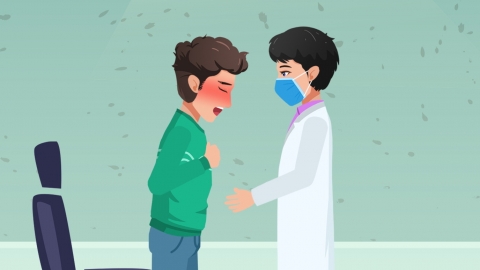What are the causes of sore throat after gastroscopy?
Gastroscopy refers to the examination of the stomach using an endoscope. Sore throat after gastroscopy may be caused by instrument irritation, local muscle tension, pharyngitis, tonsillitis, or reflux esophagitis. Appropriate management can be selected based on specific conditions. If discomfort occurs, it is recommended to visit a hospital promptly for diagnosis and follow medical advice for treatment to avoid delaying the condition.

1. Instrument irritation: During gastroscopy, the endoscope must pass through the mouth and throat into the esophagus and stomach. This process can cause mechanical friction and irritation to the throat mucosa, leading to minor mucosal damage and sore throat. Pain usually appears shortly after the examination without other accompanying symptoms. Eating should be avoided for 2 hours after the examination; afterward, small sips of warm water may be taken followed by warm, soft foods. Spicy or excessively hot foods should be avoided, and the pain typically resolves on its own within 1-2 days.
2. Local muscle tension: During the gastroscopy, patients may unconsciously tense their throat muscles due to anxiety, causing muscle soreness after the procedure when the muscles relax. This is often accompanied by a feeling of tightness in the throat. Appropriate relaxation exercises for the neck and throat, such as slow head rotations and gentle swallowing movements, may help alleviate the discomfort. Additionally, listening to music or meditating can help relieve mental tension, and the pain usually subsides within a short time.
3. Pharyngitis: Patients who already suffer from pharyngitis may experience an exacerbation of inflammation due to the gastroscopy, resulting in increased throat pain. Symptoms such as throat discomfort, dryness, itching, or a foreign body sensation may have existed before the examination and worsen afterward. Under a doctor's guidance, patients may use medications such as Guilin Watermelon Frost tablets, Yinhuang tablets, or Lanqin Oral Liquid to alleviate symptoms.
4. Tonsillitis: During gastroscopy, pathogens such as bacteria are more likely to invade the tonsillar crypts, triggering or worsening tonsillitis and causing throat pain. Symptoms include throat pain that worsens during swallowing, possibly accompanied by fever and swollen, red tonsils. It is recommended to follow medical advice and use medications such as Amoxicillin capsules, Cefixime dispersible tablets, or Pudilan Xiaoyan Oral Liquid for treatment.
5. Reflux esophagitis: Gastrointestinal function may temporarily become disordered after the examination, allowing stomach acid to more easily reflux into the esophagus and irritate the throat, causing pain. Common symptoms include heartburn, acid regurgitation, and retrosternal pain, which worsen when lying down or bending over. Under medical guidance, patients may use medications such as Omeprazole enteric-coated capsules, Domperidone tablets, or Hydrotalcite chewable tablets to relieve symptoms.
In daily life, maintaining humid indoor air and avoiding smoking and irritating foods can also aid in throat recovery.
References:
[1] Fan Xiaohua, Wu Shunu. Analysis of the application effect of comfortable nursing in painless gastroscopy patients [J]. Modern Diagnosis and Treatment, 2024, 35(19): 2990-2992.









